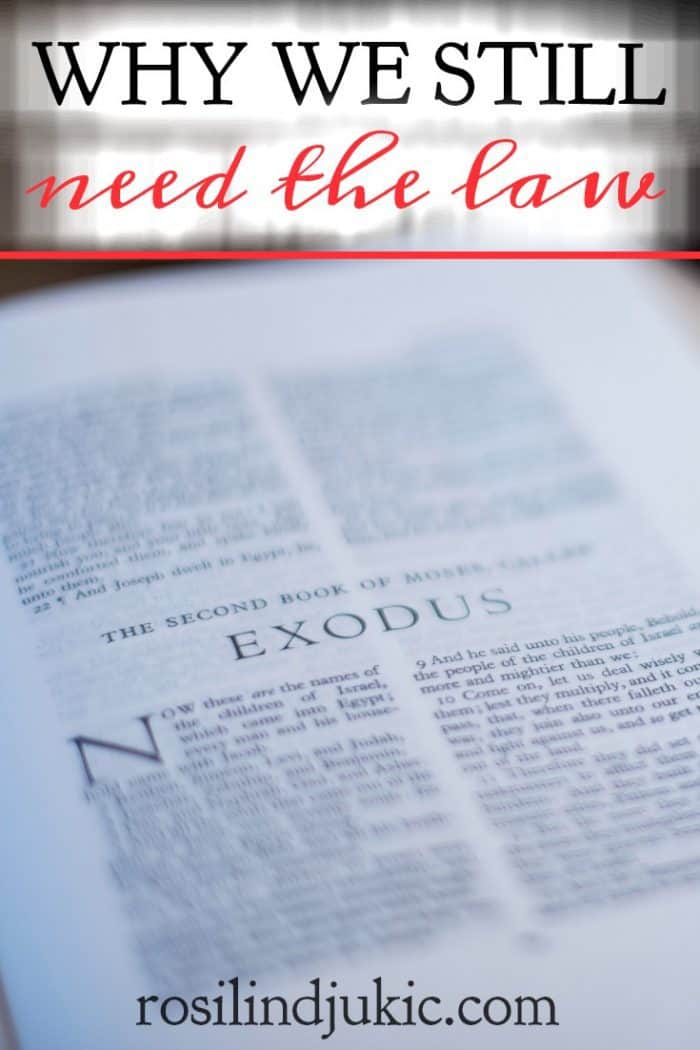Why We Still Need the Law
I hope you love the products and resources I recommend here at A Little R & R. Just so you know, it is possible that I get a commission and collect income from the links on this page. Click here for more info.
“We’re not under the law but under grace!” – a verse I’ve heard taken out of context hundreds of times; used as a “get out of jail free card” and license to ignore practical commands given by God for a reason.
It’s been used as a cherry picking method – each time they run into a principle in the Old Testament they don’t like, they pull out Paul’s words with great vigor, “Ha! I’m not under the law, I’m under grace!”

But is this what Paul really meant? Did Paul mean that by being set free from the law, we are actually not obligated to keep the law?
Not when you look at the context of what Paul was teaching.
When you look at what the law was meant for in the Old Testament in context with what Paul was teaching, you see that Paul was not freeing us from keeping Old Testament law, he was freeing us from the original usage of the law.
The Israelites were in the desert, and God was preparing to reveal to them His great plan. It was a plan based on relationship. It was a plan that would set them so far apart from every other nation that their very existence would testify to His Almighty power.
His plan was to make them a nation of priests.
Not a nation of people with some who were priests. No, a whole nation of priests who ministered before the Lord and served Him.
Unique? Yes. But that was God’s plan – a unique people.
But on the day of His visitation, they were terrified by the great noise and shaking and thunder – and their response destroyed God’s plan.
They actually told Moses, “You speak to God and relay His words to us. We don’t want God to speak to us.”
They rejected His relationship.
From there, the law was instituted, the priesthood was limited to one tribe, and there was a great distance between God and His chosen people.
The law was instituted for two reasons:
1. To cover sin and allow God to be able to look upon His people without seeing their sin
2. To dictate interpersonal relationships
You can even sum up the 10 commandments in these two categories. When we read beyond Exodus 20, we see all of the wider aspects of the law summed up in these two categories as well.
So what did Paul mean when he said we’re not under the law but under grace?
First, we have to look at Jesus’ words in Matthew 5:17: “Do not think that I came to destroy the Law or the Prophets. I did not come to destroy but to fulfill.”
The fact is, Jesus went on to make even harder to keep the law, not easier! He took the law from mere actions (do not commit adultery) to the state of the heart (those who look on a person with lustful thoughts have committed adultery).
Jesus’ life, death, burial and resurrection did not do away with the law, He fulfilled it. No longer would sin be covered, it would be cleansed. He became the sacrifice and cleansing so that our actions were not required to be accepted by God. HIS final action made us accepted by God.
In other words, He took the law from being about our requirement for acceptance to our expression of love.
[Tweet “Jesus took law from requirement to relationship.”]
The law that once served as a gavel of judgment that pronounced condemnation and led to excommunication, stoning and death, has now become the friend who takes us by the hand to lead us to the Savior who forgives and says, “Go and sin no more!”
When we read Old Testament law, we should never skim over it, but instead use it as a mirror to reveal the reflection of our heart. And then let it lead us to the throne of grace where we find mercy and forgiveness.
Because God’s original plan has been extended to us:
“But you are a chosen generation, a royal priesthood, a holy nation, His own special people, that you may proclaim the praises of Him who called you out of darkness into His marvelous light;” – 1 Peter2:9



Yes, yes, and more YES. For years I had been trying to rectify the disconnect that I continually heard between the Torah and the rest of scripture. It was by the hand of God that we were led back to retrace our steps alongside of His to return to Torah to understand our place with Him. It is not “easy” to find the balance between the two for many, BUT when we understand the heart of God it brings everything into such clarity.
I liken it to my marriage with my husband. Do I have “rules” about our relationship that he really must obey if we are to actually stay together? Absolutely! Adultery is not optional. It is not just “accepted” and “ok.” Mistreatment and disrespect are also not acceptable practices towards me. And these same rules flip around for me to extend back out towards him. So, we have our marital “laws,” BUT because of the extreme love we have for each other that is full of mutual respect, appreciation, and thanksgiving, we are happy to abide by these “laws” purely because they protect the beautiful relationship we both hold at such high value.
It is no different with our Abba. He has told us in no uncertain terms the kinds of things that break His heart and injure Him. When we dismiss those things as no longer relevant, we are saying that our relationship with Him is no longer worth the discomfort of the “rules.” In essence, HE is not worth the effort to respect His Way of extending relationship. But, for those of us who love Him, we deeply want to know the things He loves, because we want to show Him love back in response to the amazing love and grace He bestows upon us. The love is mutual and it flows freely.
Thanks for the wonderful reminder. In Him, shalom.
“When we dismiss those things as no longer relevant, we are saying that our relationship with Him is no longer worth the discomfort of the “rules.” In essence, HE is not worth the effort to respect His Way of extending relationship.”
AMEN!!! So well said!